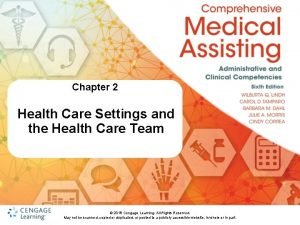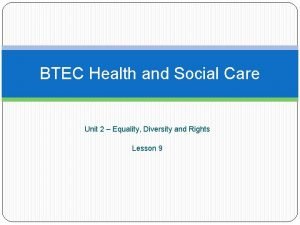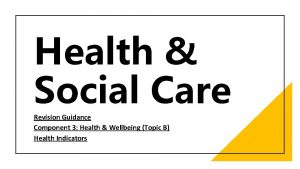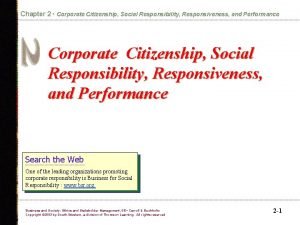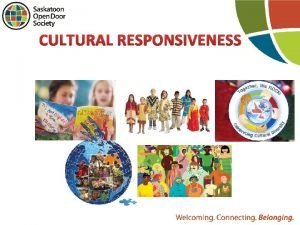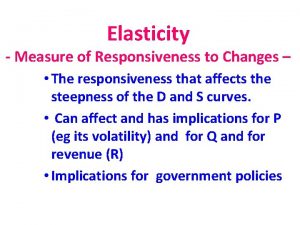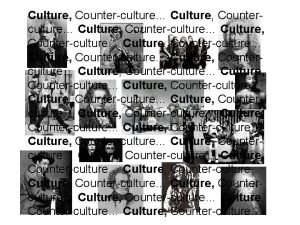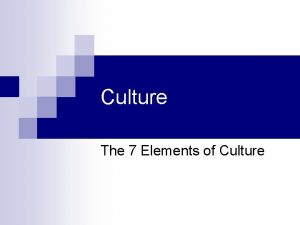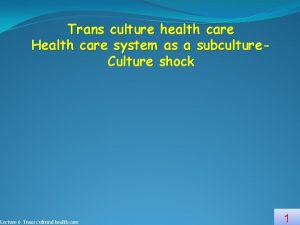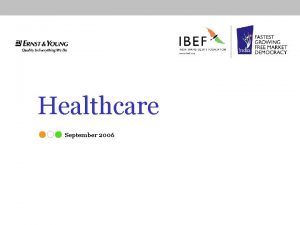Cultural Responsiveness Healthcare Cultural Responsiveness Health Care Culture













- Slides: 13

Cultural Responsiveness: Healthcare

Cultural Responsiveness & Health Care Culture determines… • • • How health and illness are defined Beliefs about what causes disease What diseases are stigmatized and why Types of health promotion activities engaged in by individuals and families The experience and expression of illness and pain Who one seeks advice and/or help from regarding health and illness The experience individuals have with healthcare providers How treatment options are understood and followed The perception of rehabilitation services of chronic disease condition

Why does cultural responsiveness matter to healthcare professionals? Caring is often called the key attribute of being nurse and is not limited to interactions with clients. Developing cultural responsiveness means that the health professional becomes aware of one’s own cultural attributes and biases, and their impact on others. Understanding one’s own worldview and that of the “other”, avoids stereotyping and the misapplication of scientific knowledge. — RNA of Ontario, 2007

Why does cultural responsiveness matter to healthcare professionals? To care for someone, I must know who I am. To care for someone, I must know who the other is. To care for someone, I must be able to bridge the gap between myself and the other. — RNA of Ontario, 2007

Cultural Responsiveness & Health Care: “Western Medicine” • The Culture of “Western” Medicine § Meliorism – make it better § Dominance over nature – take control § Activism – do something § Timeliness – sooner than later § Therapeutic aggressiveness – stronger=better § Future orientation – plan, newer=better § Standardization – treat similar the same

Cultural Responsiveness & Health Care Individualist “Western” § Make it Better § Control Over Nature § Strong Measures § Do Something § Intervene Now Collectivist “Asian/African/Indigenous” § Accept with grace § Balance/Harmony with Nature § Gentle approach § Wait and see § Cautious deliberation § Take life as it comes – Time honoured § Plan Ahead – Recent is Best § Standardize – Treat Everyone the Same § Individualize – Recognize differences

Cultural Responsiveness & Health Care: What it “looks like” • Obvious Manifestations: – Religion – Ethnicity (Race? ) – National Origin (language) – Gender • Less Obvious Manifestations: – Age – Educational Status – Mobility (including handicaps) – Previous experience with Healthcare system – Cultural norms (gender, roles, child rearing, medicine, wellness)

CHALLENGES FOR THE NEWCOMER Language barrier Conflicting values at home Conflicting understanding of healthcare system Social cues and relationships to doctors and nurses may be different Culture shock and transition stress causes behavioural issues Challenges of learning a new language and culture Parents have strict rules regarding healthcare, wellness and medicine Poverty - lack of funds for proper nutrition, medicines or knowledge of them • Refugees may have more difficulties, or ones that surface again once demands increase. • •

CHALLENGES FOR NURSES • Limited access to knowledge of cross-cultural awareness/ communication • Difficulty in building relationships and trust with children and parents • Different expectations from parents regarding healthcare, hospitalization, medicines, parent roles • Approach medicine and healthcare from own perspective • Might unwittingly make assumptions or use stereotypes • Limited access to use of translators

Knowing the Cultural Characteristics of Your Patient Population § What cultures are predominantly represented in your program? § What are the values, beliefs, traditional concepts particular to these groups? § Who are the “gatekeepers” of health within these groups? § What is the group’s perception of health and illness?

The mindset of culturally responsive healthcare professionals • Socio-cultural consciousness • High expectations • Desire to make a difference • Constructivist approach • Deep knowledge of their patients • Culturally Responsive Nursing Practices

Cultural responsiveness and healthcare: Summary §Culture is a very complex concept made up of many factors. § The “Culture Iceberg”: “Visible” and “Invisible” § Cultures can be broadly grouped into “Individualist” (Western) and “Collectivist” (Asian/African/Native) groupings which present different approaches to healthcare § Cultural Responsiveness and Healthcare has both “obvious” and “less obvious” manifestations §Cultural Responsiveness and Healthcare takes into account culture, language, country of origin, collectivist/individualist societies

Cultural Responsiveness and Healthcare: Questions/Comments § What have you learned about cultural responsiveness and healthcare? § What is the biggest surprise? §What difference will understanding cultural responsiveness and healthcare make in your relationships with people? § What difference will understanding cultural responsiveness and healthcare make in your professional practice?
 Healthcare and the healthcare team chapter 2
Healthcare and the healthcare team chapter 2 Sports medicine definition
Sports medicine definition Levels of care primary secondary tertiary quaternary
Levels of care primary secondary tertiary quaternary Care value base health and social care
Care value base health and social care Health and social component 3
Health and social component 3 Healthcare cisco smartnet total care support
Healthcare cisco smartnet total care support United healthcare community plan primary care providers
United healthcare community plan primary care providers Brief selvrapportering
Brief selvrapportering Startegic fit
Startegic fit Wilson learning social styles test
Wilson learning social styles test Social responsiveness
Social responsiveness Porter’s diamond of national advantage
Porter’s diamond of national advantage Cost responsiveness efficient frontier
Cost responsiveness efficient frontier Integration responsiveness grid
Integration responsiveness grid
